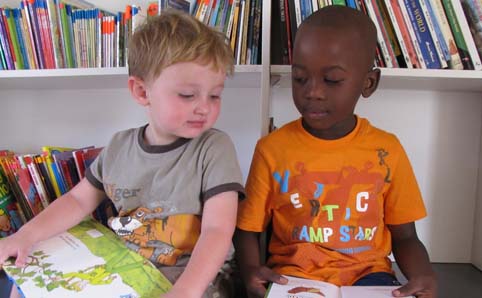 |
Little Professors in the making: Archie Barclay, 3 years, (left) and Khanya Nondabula, 6 years.
Photo: Phelekwa Mpono |
About 65 small children have taken up residence at our Bloemfontein Campus, joining the Kovsie family.
The little ones, whose ages range from three months to six years, are the first kids to enrol at The Little Professor Crèche on the campus. The crèche, with its motto Preparing little minds for greatness, opened its doors on 9 January this year.
Head of the crèche, Mrs Ricka van Kerkhof, says they received a flood of applications for the 105 available places and forty more kids will be taken in during the coming weeks. Van Kerkhof says the crèche is open to everyone, but preference is given to children of UFS personnel. Currently 90% of the kids are those of university staff.
The well-equipped crèche has enough toys to fill up a small shop and offers extramural activities such as piano lessons, swimming, chess and pottery classes. All classes have flat-screen televisions for kids to watch educational programs. The crèche caters for six classes, infants up to Grade R. The Pre-grade R Curriculum and Foundation Phase Grade Curriculum R-3 of the Free State Department of Basic Education are followed. The language of instruction is English and parents who want to enrol their kids will pay R 1150.00 per month.
Van Kerkhof, who calls her job the best in the world, says The Little Professor is not a care facility. Rather it’s a place where kids are taught to concentrate on education. “We are teaching kids to be clever.”